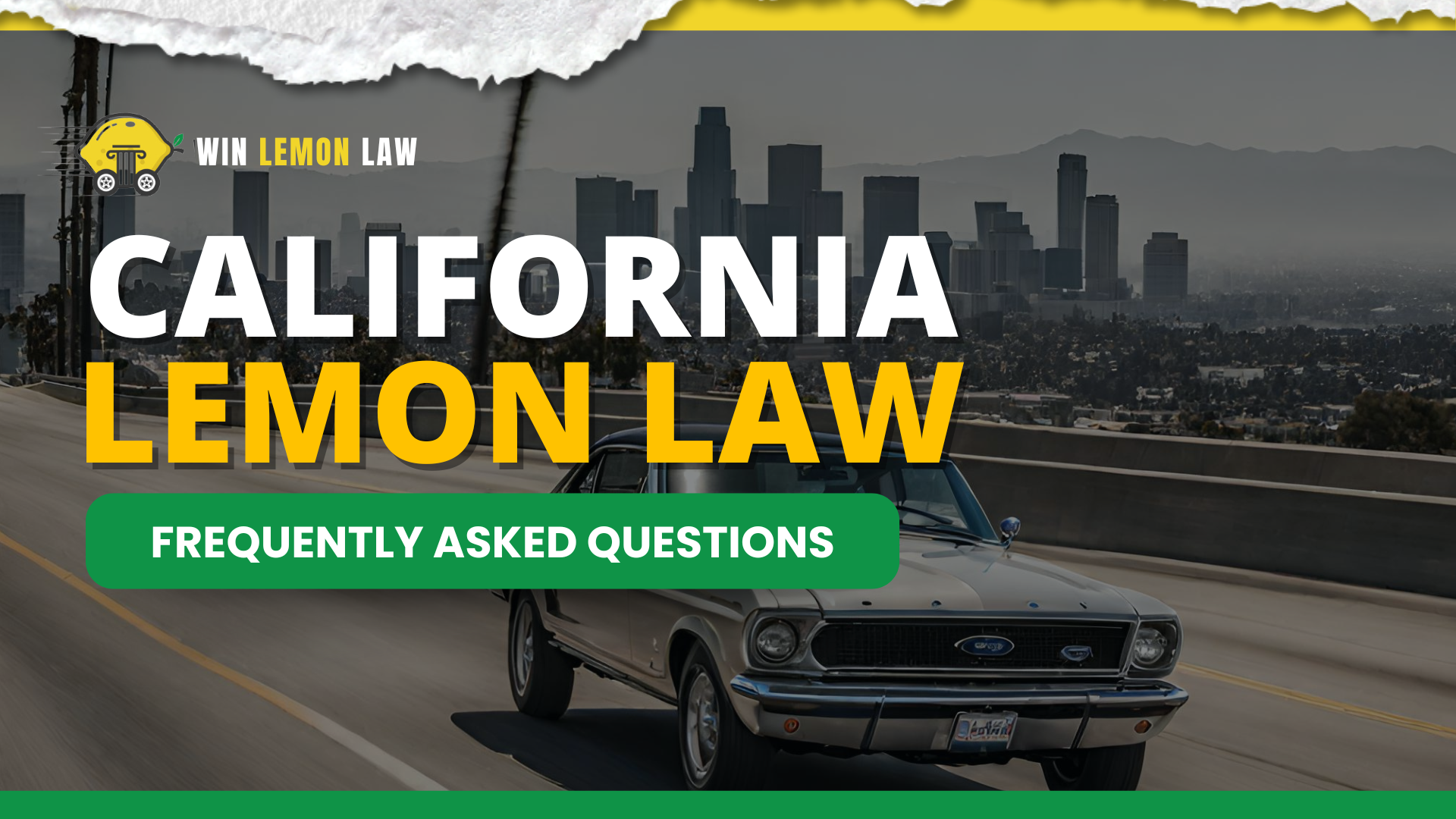Are you feeling sour about a recent vehicle purchase gone wrong? You’re not alone. Many consumers find themselves in a pickle when they end up with a lemon – a vehicle that just can’t seem to meet quality and performance standards.
But fear not, because California’s Lemon Law is here to protect you. Navigating the complexities of California’s Lemon Law can be daunting, but with the right knowledge and guidance, you can turn your lemon of a situation into lemonade.
In this guide, we’ll address some of the most frequently asked questions about California’s Lemon Law, providing clarity and empowering you to take action. Whether you’re wondering what qualifies as a lemon, how to file a claim, or what remedies are available to you, we’ve got you covered.
So sit back, grab a glass of lemonade, and let’s explore the world of California’s Lemon Law.
Understanding California’s Lemon Law
California’s Lemon Law is a robust legal framework designed to protect consumers from the frustrating and costly experience of purchasing a defective vehicle. Enshrined in Civil Code section 1793.22, this law serves as a powerful tool for consumers who find themselves grappling with persistent issues with their vehicles.
At its core, California’s Lemon Law aims to rectify situations where a vehicle falls short of meeting the standards of quality and performance promised by the manufacturer. This can manifest in various ways, such as recurring mechanical problems, safety concerns, or defects that significantly impair the vehicle’s use or value.
One of the key provisions of the Lemon Law pertains to the manufacturer’s obligation to address these issues under the vehicle’s warranty. If a consumer experiences recurring problems with their vehicle that are covered by the warranty, the manufacturer is required to make a reasonable number of repair attempts to rectify the issues.

Eligibility Criteria
In order to qualify for protection under California’s Lemon Law, your vehicle must meet certain criteria outlined by the law. These criteria serve as the threshold for determining whether a vehicle qualifies as a lemon and warrants intervention under the Lemon Law provisions.
Substantial Defect or Nonconformity
The first requirement for eligibility under the Lemon Law is that your vehicle must have a substantial defect or nonconformity that significantly impairs its use, value, or safety.
This defect could manifest in various ways, such as recurring mechanical issues, safety concerns, or defects that render the vehicle unreliable or unfit for its intended purpose.
Essentially, the defect must be significant enough to substantially impact the vehicle’s functionality or safety.
Covered by Manufacturer’s Warranty
The defect or nonconformity experienced by your vehicle must be covered by the manufacturer’s warranty. This means that the issue must fall within the scope of the warranty coverage provided by the manufacturer at the time of purchase or lease.
It’s important to review the terms and conditions of your warranty to ensure that the defect is indeed covered under the warranty provisions.
Reasonable Number of Repair Attempts
Before seeking recourse under the Lemon Law, you must have allowed the manufacturer a reasonable number of repair attempts to address the identified defect or nonconformity.
The law typically requires that the manufacturer be given multiple opportunities to repair the vehicle within a reasonable timeframe.
If despite these repair attempts, the issue persists or the vehicle remains out of service for an extended period, you may be eligible for relief under the Lemon Law.
Coverage and Protections Offered
Once a vehicle is determined to be a ‘lemon’ under the law, the manufacturer is required to either replace the vehicle or refund the purchase price less an amount for the consumer’s use.
California’s Lemon Law also extends to cover dealership repair expenses and allows for the repurchase of vehicles with loan or lease costs covered.

Frequently Asked Questions
Navigating the complexities of the Lemon Law can be confusing. Here’s a helpful rundown of the most frequently asked questions to assist you in finding the right path forward.
Q: What Qualifies as a ‘Lemon’?
A: Any new or used vehicle that has been purchased or leased primarily for personal, family, or household purposes and has a defect or nonconformity that continues to exist after a reasonable number of repair attempts falls under the Lemon Law.
Q: How to File a Claim?
A: The Lemon Law process requires that consumers first alert the manufacturer or its representative of the issues with the vehicle. It’s crucial to keep detailed records of repair attempts and all communication with the manufacturer or dealer.
If the manufacturer is unresponsive or the issue remains, a consumer could then pursue arbitration or a lawsuit.
Q: What is the Tanner Consumer Protection Act and how does it relate to the Lemon Law?
A: The Tanner Consumer Protection Act strengthens California’s Lemon Law by establishing clearer guidelines on the “reasonable number of repair attempts” before a vehicle qualifies as a lemon. It bolsters consumer protection and ensures manufacturers are held accountable.
Q: Are used cars and motor homes covered under California’s Lemon Laws?
A: Absolutely. California Lemon Laws extend to cover various vehicles, including used cars with a transferable manufacturer’s warranty and motor homes. As long as the vehicle falls within the warranty period and has significant defects, it’s covered.
Q: In what situations does the Lemon Law presumption apply, and what does it indicate for the car buyer?
A: The Lemon Law presumption kicks in when a vehicle continues to exhibit substantial problems despite multiple repair attempts. This presumption favors the consumer, indicating that the vehicle is presumed to be a lemon unless the manufacturer proves otherwise.
Q: How can a Lemon Law attorney assist with Lemon Law disputes, and is a free case review typically available?
A: Lemon Law attorneys specialize in guiding car owners through the Lemon Law claims process. They offer invaluable assistance, from filing claims to representing consumers in court. Many reputable attorneys provide free case reviews, helping you understand your options before proceeding.
Q: What Remedies Are Available to Consumers?
A: If a manufacturer violates the Lemon Law, consumers have the right to demand a replacement vehicle or a refund. Additionally, consumers may be entitled to reimbursement for expenses incurred, such as repair costs and legal fees.
Seeking Legal Advice When Needed
Navigating the complexities of lemon law cases can be daunting, especially when faced with manufacturers and their legal teams. In such situations, seeking legal advice from experienced attorneys who specialize in Lemon Law claims is crucial to ensure that your rights are protected and that you receive the compensation you deserve.
Experienced Lemon Law attorneys understand the nuances of Lemon Law regulations and have the expertise to represent clients effectively in lemon law cases. When seeking legal advice, it’s essential to find a reputable law firm with a track record of success in handling Lemon Law claims.
During a free case review, attorneys will assess the viability of your claim and provide guidance on the best course of action. This evaluation allows attorneys to understand the specifics of your situation, review any evidence or documentation you may have, and advise you on your legal options.
If your claim is deemed viable, Lemon Law attorneys will guide you through every step of the legal process, from filing the claim to negotiating with the manufacturer and representing you in court if necessary. They will work diligently to ensure that your rights are vigorously defended and that you receive fair compensation for your lemon vehicle.
Throughout the process, Lemon Law attorneys will maintain open communication with you, keeping you informed of developments in your case and addressing any questions or concerns you may have. Their goal is to provide you with personalized attention and dedicated advocacy, ultimately achieving the best possible outcome for your Lemon Law claim.
When seeking legal advice for a lemon law case, it’s essential to choose attorneys who are knowledgeable, experienced, and dedicated to fighting for your rights. By partnering with experienced Lemon Law attorneys, you can navigate the legal process with confidence and pursue the compensation you deserve for your defective vehicle.
Closing
At Win Lemon Law, we understand the intricacies of lemon law cases and are dedicated to helping consumers assert their rights and seek justice. Our team of experienced Lemon Law attorneys is well-versed in the nuances of Lemon Law regulations and has a proven track record of successfully representing clients in lemon law cases.
If we determine that you have a valid lemon law claim, we will guide you through every step of the legal process, from filing the claim to negotiating with the manufacturer and representing you in court if necessary. Our goal is to ensure that your rights are vigorously defended and that you receive the maximum compensation available under the law.
When it comes to lemon law cases, having a knowledgeable and experienced legal team on your side can make all the difference. If you find yourself dealing with a defective vehicle and believe you may have a lemon law claim, don’t hesitate to reach out to Win Lemon Law for assistance.
We’re here to help you navigate the legal process and fight for the justice and compensation you deserve.

